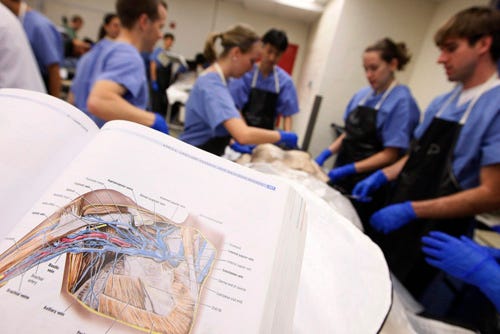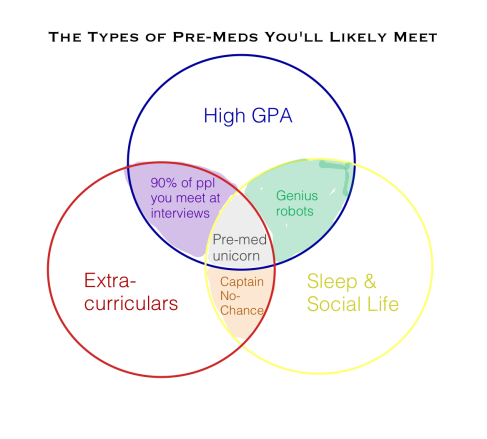I remember in high school, summer vacations were abundant and I was often bored. I’d go see family year after year, doing the same old, same old. When I began undergrad, I thought the same pattern would continue. But as my premed years progressed, I realized the summer months were few and valuable. The precious 4 months are the only time in the year where you are free from school, and there’s so many things you could be doing. Medical schools start paying attention to what you’re doing starting from the last few years of high school. So be wise with how you spend your summers, after all, there’s only 4 of them left before medical school (hopefully)!
1. Summer School
I used my summer after first year to take organic chemistry online, because I suck at chemistry and wanted to focus my attention on it instead of sharing it with other courses during the regular school year. If there’s a prerequisite that you want to concentrate on, it may be a good idea to do it in the summer. Taking summer courses would also be a good idea for those of you who are scrambling to meet your prerequisites as well. But keep in mind that many schools (eg University of Toronto) requires or strongly prefers students who have a full course load for all 4 years of undergrad. So despite the fact that you took some summer courses, think twice before taking fewer than full course load during the school year.
2. Research
Research in any field (neuroscience, psychology, cancer, kinesiology, etc.) develops skills that med schools look for in their students. It will also hone your patience, detail orientation, and scientific knowledge. It doesn’t necessarily have to be paid, volunteer research positions will do as well (if your finances allows it). If you think a research position in the summer is right for you, start looking EARLY. I’m talking December or January. Profs usually get bombarded with requests like these, so try for a prof that you know well, or look for your school’s job postings (like work study). If you have the sponsorship and grades for it, apply for a research scholarship like NSERC.
Keep in mind that though med schools look favourably upon research, you shouldn’t spend your summers doing it unless you enjoy it. You will feel like you’ve wasted your summer, AND if you’re not passionate about your research, schools will be able to tell!
3. Work
Everyone needs some financial help, after all, undergrad is expensive! Don’t feel as if medical schools only want to see research jobs, the fact that you worked in the summer to support yourself shows initiative and responsibility. If you’re able to combine summer work with something that you love (ie working with kids at a camp, research job, or part timing at a vet clinic), then that’s perfect!
4. Volunteer
Another option is to do some volunteering. You could volunteer abroad for clinical experience, building schools, leading summer camps, the list is endless. I did that in the summer after my third year with the West Africa AIDS Foundation. I got to go to Ghana and experience a different culture and a different health care system. It was one of the best decisions I ever made. I saw real life medicine. I’ve shadowed doctors in Canada, Taiwan, and Ghana, and never before that summer have I truly seen suffering. It was a humbling experience and has inspired my goal of working for doctors without borders when I get my licence. However, I know some eager premeds will consider going abroad to volunteer because they think it’ll pad their resume. Like I said about research, if your intentions are to pad your resume instead of actually being interested in the thing that you’re doing, it will show during your application/interview AND you will not enjoy it.
Volunteer trips also tend to be rather expensive. For example, Students Offering Support‘s South/Central American trips to build schools is upwards $2000 for 2 weeks (not including airfare). Be weary of companies that advertise to send you to Australia or Africa for a couple of weeks – if they need to hire people to shout advertisements at your school, doesn’t it make you doubt their legitimacy?
My trip with WAAF was amazing and cheap. It was roughly $3000 for everything, including airfare, for about 6 weeks. It’s much cheaper because it’s a private NGO that doesn’t charge a “administration fee”. If you’re interested in receiving more information about it, feel free to message me or tweet me. 🙂
5. Solo travel
I love travelling. I think it is one of the best ways to discover the world and discover yourself. I never realized how big the world was until I went backpacking through Europe in my second year. It was amazing. If you have the money, travel. It will be the best thing you ever do. You’ll see things you’ve never seen and meet people you never dreamt of meeting. You could also combine volunteering (number 4) with travel! Find a volunteer trip that gives you some freedom to move around on the weekends, or plan out your trip following the outreach.
After medical school, chances are you’ll be too busy to travel and see the world – so I would suggest doing it now! Medical schools also look favourably upon students who have some cultural experiences as well, so it’s not a “waste” of your summer, as premeds tend to say.
—–
If you take one thing away from this post, it is that you should always treasure your summers – don’t just sit at home sipping on spiked lemonade – do something worthwhile and interesting. Most of all, don’t push yourself to get involved in an activity for the sake of padding your resume; THAT is wasting your time.
—–
In case you’re interested, here’s what I’ve done with my summers:
Year 1: Visited family + took Orgo online
Year 2: Worked at my university + backpacked through Europe for the last 3 weeks of summer
Year 3: Volunteered abroad in Ghana with WAAF for 6 weeks + volunteered at a clinical research lab for 2 months
Year 4 (upcoming): Planning to backpack through Asia
 Find candidates not with a perfect transcript, but with a genuine passion for providing care to society
Find candidates not with a perfect transcript, but with a genuine passion for providing care to society